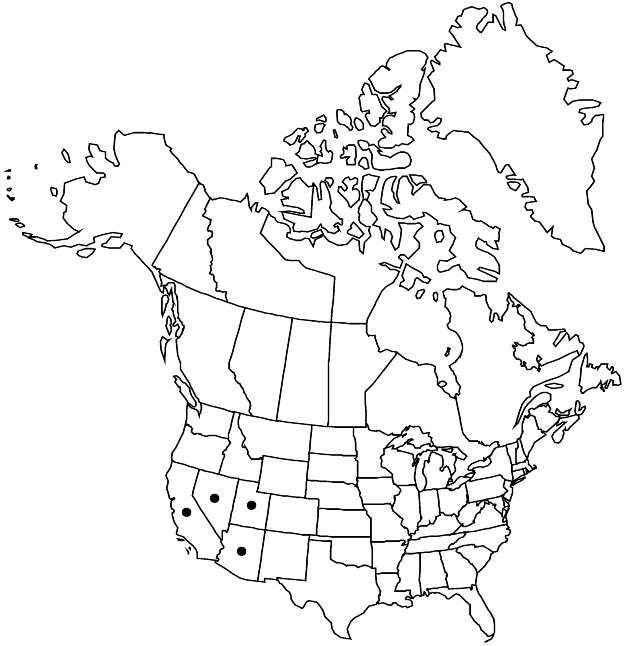Difference between revisions of "Eriogonum umbellatum var. juniporinum"
Great Basin Naturalist 45: 279. 1985.
FNA>Volume Importer |
imported>Volume Importer |
||
| (5 intermediate revisions by one other user not shown) | |||
| Line 8: | Line 8: | ||
}} | }} | ||
|common_names=Juniper sulphur flower | |common_names=Juniper sulphur flower | ||
| + | |special_status={{Treatment/ID/Special_status | ||
| + | |code=E | ||
| + | |label=Endemic | ||
| + | }} | ||
|basionyms= | |basionyms= | ||
|synonyms= | |synonyms= | ||
| Line 24: | Line 28: | ||
|elevation=1300-2300(-2500) m | |elevation=1300-2300(-2500) m | ||
|distribution=Ariz.;Calif.;Nev.;Utah. | |distribution=Ariz.;Calif.;Nev.;Utah. | ||
| − | |discussion=<p>Variety juniporinum is widespread and infrequent in widely scattered and disjunct populations in isolated desert mountain ranges from southern Utah (Navajo Mountains, San Juan County and Beaverdam Mountains, Washington County) and north-central Arizona (Kaibab Plateau, Coconino County) westward across southern Nevada (Spring Range of Clark County, Mt. Irish and Mormon Range in Lincoln County, and Schell Creek and Snake ranges in White Pine County) to California (southeastern Inyo and northeastern San Bernardino counties, mainly Clark Mountain, Kingston, New York, and Providence ranges, and in the Mid Hills). A collection supposedly from the San Bernardino Mountains of California (Meebold 20381, M) surely is mislabeled.</p><!-- | + | |discussion=<p>Variety juniporinum is widespread and infrequent in widely scattered and disjunct populations in isolated desert mountain ranges from southern Utah (Navajo Mountains, San Juan County and Beaverdam Mountains, Washington County) and north-central Arizona (Kaibab Plateau, Coconino County) westward across southern <i>Nevada</i> (Spring Range of Clark County, Mt. Irish and Mormon Range in Lincoln County, and Schell Creek and Snake ranges in White Pine County) to California (southeastern Inyo and northeastern San Bernardino counties, mainly Clark Mountain, Kingston, New York, and Providence ranges, and in the Mid Hills). A collection supposedly from the San Bernardino Mountains of California (Meebold 20381, M) surely is mislabeled.</p><!-- |
| − | --><p>Variety juniporinum is most closely related to var. subaridum, but immature plants (or specimens without habit information) may be confused with var. versicolor. These plants most frequently are seen in San Bernardino County, California, and in White Pine County, Nevada. They would make an attractive addition to the garden.</p> | + | --><p>Variety juniporinum is most closely related to <i></i>var.<i> subaridum</i>, but immature plants (or specimens without habit information) may be confused with <i></i>var.<i> versicolor</i>. These plants most frequently are seen in San Bernardino County, California, and in White Pine County, <i>Nevada</i>. They would make an attractive addition to the garden.</p> |
|tables= | |tables= | ||
|references= | |references= | ||
| Line 34: | Line 38: | ||
-->{{#Taxon: | -->{{#Taxon: | ||
name=Eriogonum umbellatum var. juniporinum | name=Eriogonum umbellatum var. juniporinum | ||
| − | |||
|authority=Reveal | |authority=Reveal | ||
|rank=variety | |rank=variety | ||
| Line 48: | Line 51: | ||
|publication title=Great Basin Naturalist | |publication title=Great Basin Naturalist | ||
|publication year=1985 | |publication year=1985 | ||
| − | |special status= | + | |special status=Endemic |
| − | |source xml=https:// | + | |source xml=https://bitbucket.org/aafc-mbb/fna-data-curation/src/2e0870ddd59836b60bcf96646a41e87ea5a5943a/coarse_grained_fna_xml/V5/V5_707.xml |
|subfamily=Polygonaceae subfam. Eriogonoideae | |subfamily=Polygonaceae subfam. Eriogonoideae | ||
|genus=Eriogonum | |genus=Eriogonum | ||
Latest revision as of 22:13, 5 November 2020
Subshrubs or shrubs, mostly spreading to erect, 4–8 × 5–10 dm. Aerial flowering stems erect, 1–2.5 dm, floccose or glabrous, without one or more leaflike bracts ca. midlength. Leaves in loose rosettes; blade elliptic, (0.7–)1–2 × (0.3–)0.5–1(–1.2) cm, floccose or glabrous on both surfaces, margins plane. Inflorescences compound-umbellate, branched 2–5 times; branches floccose or glabrous, without a whorl of bracts ca. midlength; involucral tubes (2.5–)3–3.5 mm, lobes 1–2.5 mm. Flowers (4–)5–6 mm; perianth cream, whitish, or pale yellow to greenish yellow, without large reddish spot on midrib.
Phenology: Flowering Jun–Oct.
Habitat: Sandy to gravelly flats and slopes, saltbush and sagebrush communities, pinyon-juniper and occasionally montane conifer woodlands
Elevation: 1300-2300(-2500) m
Distribution

Ariz., Calif., Nev., Utah.
Discussion
Variety juniporinum is widespread and infrequent in widely scattered and disjunct populations in isolated desert mountain ranges from southern Utah (Navajo Mountains, San Juan County and Beaverdam Mountains, Washington County) and north-central Arizona (Kaibab Plateau, Coconino County) westward across southern Nevada (Spring Range of Clark County, Mt. Irish and Mormon Range in Lincoln County, and Schell Creek and Snake ranges in White Pine County) to California (southeastern Inyo and northeastern San Bernardino counties, mainly Clark Mountain, Kingston, New York, and Providence ranges, and in the Mid Hills). A collection supposedly from the San Bernardino Mountains of California (Meebold 20381, M) surely is mislabeled.
Variety juniporinum is most closely related to var. subaridum, but immature plants (or specimens without habit information) may be confused with var. versicolor. These plants most frequently are seen in San Bernardino County, California, and in White Pine County, Nevada. They would make an attractive addition to the garden.
Selected References
None.